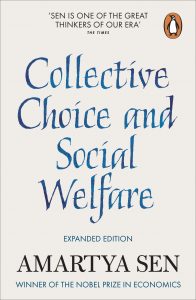I just finished (re-)reading Amartya Sen’s Collective Choice and Social Welfare. The parenthesis isn’t because I can’t remember but because the original 1970 book has been republished with a chunky new section. It isn’t an easy read, even with the corralling of the technical proofs into alternate, starred chapters. Sen addresses the dilemma raised by Arrow’s impossibility theorem and the wider family of impossibility results, which state that a few totally reasonable-seeming assumptions about principles of social choice end up with no decision rule able to satisfy them. The technical language is that between them the assumptions – transitivity, independence of irrelevant alternatives, unrestricted domain, the Pareto (or unanimity) principle, and non-dictatorship – leave a null set. I’ve always thought of it in the shorthand of there being unavoidable conflicts/trade-offs/dilemmas in social choice. Sen shows that for many social choice questions, the assumptions are too restrictive. ‘Unrestricted domain’ means throwing away relevant information; the Pareto condition forbids interpersonal comparisons such as between the rich and the poor. He argues that welfare economics has been impoverished by the Lional Robbins diktat that interpersonal comparisons could not be permitted: it is bizarre that the subject has had so little to say about the distribution of resources and incomes, self-hamstrung for decades.
The additional chapters extend the original and present in a more rigorous manner some of the material in Sen’s The Idea of Justice. There’s a timely chapter on democracy: “Given the mixed bag of results that we can actually get from majoritarian democracy, its defence, important as it is, needs to be seriously supplmented by probing scrutiny of its limits and conditionality.” This written after last November’s US Presidential election.
Not a book for the general reader – The Idea of Justice is a better presentation of Sen’s important work for that audience. But economists should have read Collective Choice and Social Welfare, especially those working on or in public policy. For all its logical abstractions, this is a very practical book.

“Not a book for the general reader – is a better presentation of Sen’s important work for that audience” Is something missing form the text, Diane?
Likely – I’ll check, thank you!
perhaps you had Theory of Justice in mind?
‘The Idea of Justice’. I corrected the gap in the post.
bw, Diane
Thanks Diane I guessed you had that book in mind but just wanted to be sure!